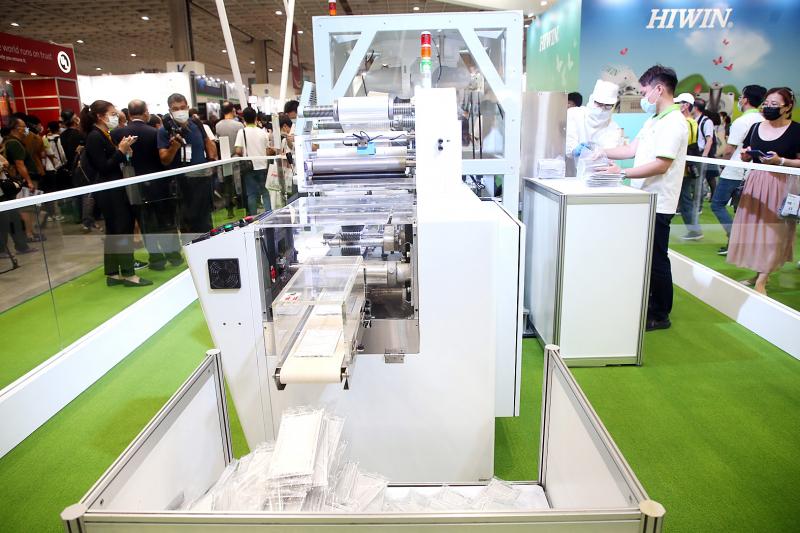The Taiwan Automation Intelligence and Robot Show began at the Taipei Nangang Exhibition Center yesterday, with many exhibitors emphasizing the importance of a “digital transition,” which they said helps manufacturers boost production capacity and quality.
At the exhibition, robotic arms demonstrate their ability to slow operations when they detect humans nearby, which helps prevent accidents, while at another booth, a demonstration shows how logistics systems can decrease the staff required to manage a warehouse.
“The production line of the future will require cooperation between humans and machines,” Qisda Corp (佳世達) business solution group general manager Michael Lee (李昌鴻) said. “The ‘swiping’ generation grew up with smart technology and they are about to enter the manufacturing workforce.”

Photo: CNA
Other exhibitors include machinery maker Hiwin Technologies Co (上銀科技), pneumatic parts maker Taiwan Chelic Corp (台灣氣立), Teco Electric & Machinery Co (東元電機), power and thermal solutions provider Delta Electronics Co (台達電), industrial computer maker Advantech Co Inc (研華), Techman Robot Inc (達明機器人), the Industrial Technology Research Institute and the Ministry of Science and Technology.
The annual show is hosted by the Taiwan Automation Intelligence and Robotics Association and is held as an online/offline exhibition where people can walk the floors in Taipei while people joining online can peruse virtual booths.
At the opening ceremony, Minister of Science and Technology Wu Tsung-tsong (吳政忠) called for his ministry, the Ministry of Economic Affairs and the Ministry of Education to work together to take Taiwan’s trillion-New Taiwan dollar mechanical industry to the next level.
The exhibition is open through Saturday at the Nangang Exhibition Center’s halls 1 and 2.

Shares in Taiwan closed at a new high yesterday, the first trading day of the new year, as contract chipmaker Taiwan Semiconductor Manufacturing Co (TSMC, 台積電) continued to break records amid an artificial intelligence (AI) boom, dealers said. The TAIEX closed up 386.21 points, or 1.33 percent, at 29,349.81, with turnover totaling NT$648.844 billion (US$20.65 billion). “Judging from a stronger Taiwan dollar against the US dollar, I think foreign institutional investors returned from the holidays and brought funds into the local market,” Concord Securities Co (康和證券) analyst Kerry Huang (黃志祺) said. “Foreign investors just rebuilt their positions with TSMC as their top target,

H200 CHIPS: A source said that Nvidia has asked the Taiwanese company to begin production of additional chips and work is expected to start in the second quarter Nvidia Corp is scrambling to meet demand for its H200 artificial intelligence (AI) chips from Chinese technology companies and has approached contract manufacturer Taiwan Semiconductor Manufacturing Co (TSMC, 台積電) to ramp up production, sources said. Chinese technology companies have placed orders for more than 2 million H200 chips for this year, while Nvidia holds just 700,000 units in stock, two of the people said. The exact additional volume Nvidia intends to order from TSMC remains unclear, they said. A third source said that Nvidia has asked TSMC to begin production of the additional chips and work is expected to start in the second

REVENUE PERFORMANCE: Cloud and network products, and electronic components saw strong increases, while smart consumer electronics and computing products fell Hon Hai Precision Industry Co (鴻海精密) yesterday posted 26.51 percent quarterly growth in revenue for last quarter to NT$2.6 trillion (US$82.44 billion), the strongest on record for the period and above expectations, but the company forecast a slight revenue dip this quarter due to seasonal factors. On an annual basis, revenue last quarter grew 22.07 percent, the company said. Analysts on average estimated about NT$2.4 trillion increase. Hon Hai, which assembles servers for Nvidia Corp and iPhones for Apple Inc, is expanding its capacity in the US, adding artificial intelligence (AI) server production in Wisconsin and Texas, where it operates established campuses. This

US President Donald Trump on Friday blocked US photonics firm HieFo Corp’s US$3 million acquisition of assets in New Jersey-based aerospace and defense specialist Emcore Corp, citing national security and China-related concerns. In an order released by the White House, Trump said HieFo was “controlled by a citizen of the People’s Republic of China” and that its 2024 acquisition of Emcore’s businesses led the US president to believe that it might “take action that threatens to impair the national security of the United States.” The order did not name the person or detail Trump’s concerns. “The Transaction is hereby prohibited,”